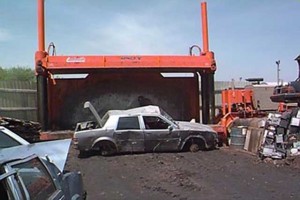
As many as a quarter million Clunkers could be crushed under the CARS program - even more if the Senate signs on to a $2 billion expansion of the Cash-for-Clunkers program.
If there’s a chance it’s broke, fix it. That seems to be the preemptive mantra of federal lawmakers, responding to word that the Cash-for-Clunkers program is ready to run out of gas, or, more accurately, cash.
The program, conceived as a way to kick-start the sluggish American automotive market, was passed by Congress, in June, though it only formally went into operation a week ago. Officially known as CARS, for Cash Allowance Rebate System, it provided vouchers worth up to $4,500 for those trading in old vehicles for newer, more fuel-efficient models.
Originally intended to run through November, and to help promote the sale of around 250,000 high-mileage models, there are preliminary indications the Clunkers program is far exceeding even the most optimistic expectations. Already, the CARS fund has issued vouchers to about 96,000 motorists, but with overloaded dealers struggling to fill in the paperwork, observers now believe that the $1 billion set aside by Congress may already have been exceeded.
“My showroom is packed,” said dealer Earl Stewart, of Earl Stewart Toyota, in Riviera Beach, Florida. He added he is “really concerned” that he may not be able to complete sales with 61 new customers if, in fact, CARS has run out of cash.
Dealer Stewart isn’t the only one worrying. In a Friday afternoon meeting with reporters, Pres. Barack Obama noted that the Clunkers program has “succeeded well beyond our expectations and all expectations,” but warned that there “legitimate concerns funding in this program may soon go out.”
But even as the president called on Congress to expand the measure – which was originally proposed with a $4 billion fund – the House of Representatives was debating ways to keep CARS going. Lawmakers wound up approving an additional $2 billion in cash, before heading home for their annual summer break.
The additional money “would come from unappropriated recovery funds,” noted Senator Debbie Stabenow, a Michigan Democrat, referring to the economic stimulus bill enacted early this year. Stabenow said she is planning to meet with Senate colleagues next week and despite the Washington break, there is a chance the CARS program could be kept moving uninterrupted.
Automakers are set to release their July sales reports on Monday, and preliminary indications are that there will be a significant jump in volume over the dismal numbers of the first half of 2009. Subaru and Ford, among others, have hinted that July could be the first month in which the industry actually exceeds year-earlier levels, though July 2008 was itself a weak month, coming at the peak in the fuel price run-up.
But there seems little doubt that Clunkers is getting people into showrooms, according to numerous industry watchers.
“Frankly, I was a bit skeptical,” when the program was originally announced, admitted Florida dealer Stewart, adding that CARS has “exceeded my expectations.”
By Wednesday, 22,782 vehicles had been purchased by the government, under CARS. Those clunkers will then be sold for scrap. But the National Automobile Dealers Association reported a sizable backlog of trade-ins not yet approved and processed by the government – an average of 13 for every one of the 23,000 participating dealers, according to NADA.
“There’s a significant backlog of ‘cash for clunkers’ deals that make us question how much funding is still available in the program,” Bailey Wood, a spokesman for the dealers group told the Associated Press.
Though lawmakers ultimately made significant changes in the language, the Clunkers legislation was modeled after similar measures, in countries such as Germany, that have helped revitalize stalled automotive sales. From a peak of more than 17 million cars, trucks and crossovers a year, early in the decade, 2009 sales have been so far moving at a rate that would fall below 10 million for the full year.
The CARS program, however, was conceived not only to boost sales but to help get the oldest vehicles in the American fleet off the road. Aging vehicles, especially those poorly maintained, produce significantly higher levels of pollutants, such as smog-causing oxides of nitrogen – as well as the carbon dioxide linked to global warming.
Massachusetts Congressman Ed Markey, one of the original sponsors of CARS, said he was still hoping the program would “reach…its goal of helping consumers take 1 million gas guzzlers off the road.”

Another manifestation of the “bailout” mentality that politicians have created.